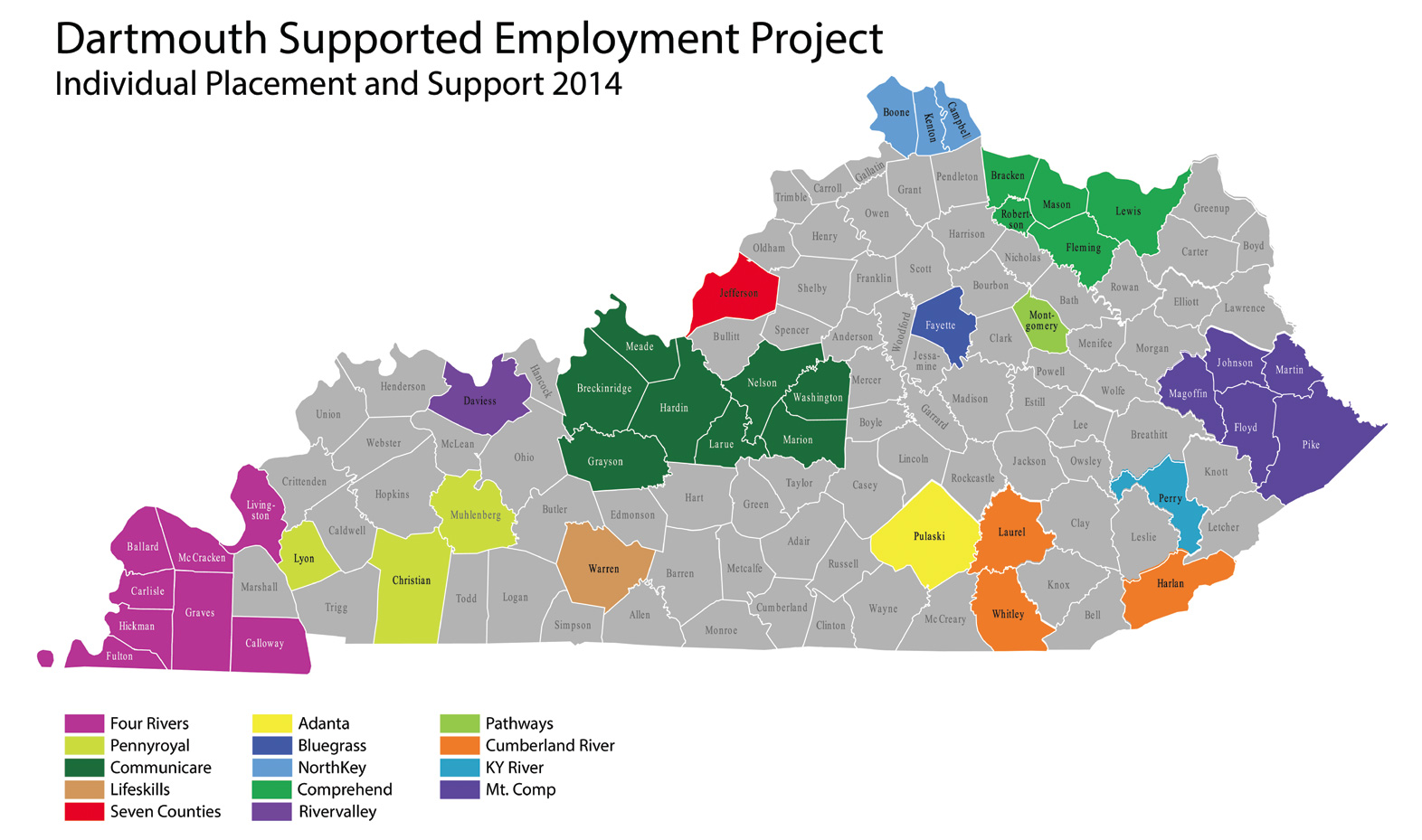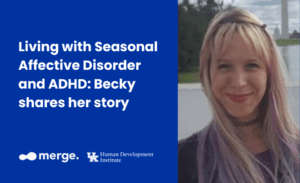In 2010, the Kentucky Division of Behavioral Health in partnership with the KY Office of Vocational Rehabilitation received a four year grant from Dartmouth University-Johnson & Johnson to implement Individual Placement and Support (IPS) Supported Employment. That grant led to the Dartmouth Supported Employment Project here at HDI, with Lori Norton as Project Director.
IPS refers to the evidence based practice of supported employment. Kentucky was the 12th state to receive this grant. IPS Supported Employment helps people with serious mental illness get and keep the jobs of their choosing. IPS is an evidence based practice proven to help people get jobs. IPS focuses on people’ strengths and uses a team approach that includes the client, Employment Specialist, Vocational Rehabilitation Counselor, family, case manager, therapist, and any other important people in the person’s life. Services are individualized and ongoing. IPS also has a fidelity scale that measures the key ingredients of evidence based supported employment.
The IPS approach changes the way mental health services are delivered. In the past, the focus was on promoting stabilization and maintenance. IPS promotes recovery and wellness. Any person who has a serious mental illness and says he or she wants to work is eligible for the IPS program, regardless of past work history, personal decisions about medications, substance use, or justice involvement. It honors client preferences and builds on what works for the person.
Some may wonder “Is work too stressful? Will it cause more symptoms?” Joe Marrone, employment trainer, once said, “if you think work is stressful, try unemployment.” When people begin to think about going to work, there may be some fears that come up from the person, the family, or the practitioners. For many people, work is a big part of the recovery process. Work promotes hope (to be such a small word, it has such a huge impact), gives a sense of purpose, and is a place to meet new people and friends. In fact, the research has shown that improvements may occur in symptoms, self-esteem, and satisfaction with finances. Pat Deegan, Ph.D., psychologist and advocate of the mental health recovery movement, once said, “what most people want is a job, a car, and a date on Friday night.”
When implementation of IPS began in Kentucky in 2010, it started with four Community Mental Health Centers, Communicare in Elizabethtown, Comprehend in Maysville, Northkey in Covington/Florence, and Four Rivers in Paducah. IPS started out in six counties with six employment specialists and four Supported Employment supervisors. Over the past four years, the program has expanded to all fourteen Community Mental Health Centers in Kentucky. IPS is now in forty-nine counties, with thirty-five employment specialists, seventeen SE supervisors and thirty-eight VR liaisons.
HDI also hired an additional Supported Employment Trainer, Lindsey Emberton, to provide training and technical assistance to the sites and VR counselors. There are new goals for the upcoming 2015 year; one goal is to expand IPS into new counties, with the long term goal of having services in all 120 counties. We also learned through a recent survey that the average age of a client who received IPS is 37 years old; therefore, we would like to promote awareness and access of IPS to transition-aged youth as another goal for 2015.
This year, Kentucky was chosen by Dartmouth to host their annual conference. All states and countries that are a part of the collaborative were invited to come to Kentucky. One of our exemplary sites, Communicare, received the 2014 Transformation award at this event! Last year our Kentucky NAMI Family Advocates received the Family Advocacy Award. The family advocates educate IPS teams on the important roles that family can play in the employment process. They educate other families and community members about the benefits of work. They also promote expansion of services by advocating with the state legislature for policy and budgetary supports for IPS.
Most importantly, over the past four years, many lives have been changed. Since January of this year through September 30th, there have been 209 job starts. One person from the IPS program was the first recipient of the Goodwill Cars to Work Program. Another person was able to live out her dream of owning her own candy making business called Marble Top Candy Shop.
Here is what a few people have said about their jobs and what going to work has meant to them:
“Over the past five years I have been disabled. Living day to day. Without purpose in life, I was depressed. I also felt anxious when thinking about my life. I was then referred to employment services and Denise Jones. She showed me what a worthwhile person I was. I am now working as a Peer Support Specialist with Cumberland River Behavioral Health”
Daniel, Cumberland River
“There is hope. It takes dedication and effort, but change is possible despite many obstacles. I am living proof of that.”
Shannon, Lifeskills



